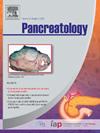HTF4 modulates the transcription of GID2 to promote the malignant biological behavior of pancreatic cancer
IF 2.8
2区 医学
Q2 GASTROENTEROLOGY & HEPATOLOGY
引用次数: 0
Abstract
Background
Helix-loop-helix transcription factor 4 (HTF4) as an anti-cancer target has been reported in many human cancers, but limited data exists regarding the effect of HTF4 in pancreatic cancer. In this study, we aimed to investigate the role of HTF4 in pancreatic cancer.
Methods
The expression levels of HTF4 in clinical pancreatic cancer samples were measured. HTF4 was knocked down or overexpressed in pancreatic cancer cells and was subsequently tested for bio-function using in vitro assays and in vivo. The regulation of HTF4 on GID2 was assessed via bioinformatic tools and dual-luciferase reporter assay.
Results
We found that HTF4 was highly expressed in pancreatic cancer tissues and correlated with poor patient prognosis. In addition, knocking down HTF4 expression inhibited cell proliferation, migration, and invasion, whereas HTF4 overexpression exerted the opposite effect. Moreover, HTF4 promoted tumor growth and metastasis in pancreatic cancer. Further, HTF4 bound to the GID2 promoter region and promoted transcriptional activation of GID2 in pancreatic cancer cells. GID2 knockdown suppressed HTF4-induced malignant behaviors of pancreatic cancer cells.
Conclusions
Our findings suggest that the HTF4/GID2 axis accelerates the progression of pancreatic cancer, providing a potential therapeutic target and prognostic indicator for the treatment of pancreatic cancer patients.
HTF4 可调节 GID2 的转录,从而促进胰腺癌的恶性生物学行为。
背景:螺旋-环-螺旋转录因子4(HTF4)作为抗癌靶点在许多人类癌症中都有报道,但有关HTF4在胰腺癌中的作用的数据却很有限。本研究旨在探讨 HTF4 在胰腺癌中的作用:方法:测定HTF4在临床胰腺癌样本中的表达水平。在胰腺癌细胞中敲除或过表达 HTF4,然后用体外实验和体内实验检测其生物功能。通过生物信息学工具和双荧光素酶报告实验评估了HTF4对GID2的调控作用:结果:我们发现 HTF4 在胰腺癌组织中高表达,并与患者的不良预后相关。此外,敲除 HTF4 表达可抑制细胞增殖、迁移和侵袭,而 HTF4 过表达则产生相反的效果。此外,HTF4 还能促进胰腺癌的肿瘤生长和转移。此外,HTF4 与 GID2 启动子区域结合,促进了 GID2 在胰腺癌细胞中的转录激活。GID2 基因敲除抑制了 HTF4 诱导的胰腺癌细胞恶性行为:我们的研究结果表明,HTF4/GID2 轴加速了胰腺癌的进展,为胰腺癌患者的治疗提供了潜在的治疗靶点和预后指标。
本文章由计算机程序翻译,如有差异,请以英文原文为准。
求助全文
约1分钟内获得全文
求助全文
来源期刊

Pancreatology
医学-胃肠肝病学
CiteScore
7.20
自引率
5.60%
发文量
194
审稿时长
44 days
期刊介绍:
Pancreatology is the official journal of the International Association of Pancreatology (IAP), the European Pancreatic Club (EPC) and several national societies and study groups around the world. Dedicated to the understanding and treatment of exocrine as well as endocrine pancreatic disease, this multidisciplinary periodical publishes original basic, translational and clinical pancreatic research from a range of fields including gastroenterology, oncology, surgery, pharmacology, cellular and molecular biology as well as endocrinology, immunology and epidemiology. Readers can expect to gain new insights into pancreatic physiology and into the pathogenesis, diagnosis, therapeutic approaches and prognosis of pancreatic diseases. The journal features original articles, case reports, consensus guidelines and topical, cutting edge reviews, thus representing a source of valuable, novel information for clinical and basic researchers alike.
文献相关原料
公司名称
产品信息
阿拉丁
DAPI
阿拉丁
4 % paraformaldehyde
 求助内容:
求助内容: 应助结果提醒方式:
应助结果提醒方式:


